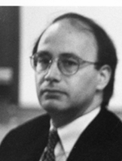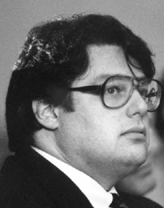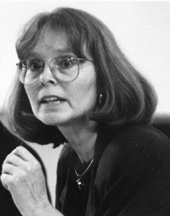|

War in the Trenches: On-line Tools and Democracy
Friday, May 8, 1998
4:00 - 6:00 pm
Speakers: Eric Loeb, David Winston and Ellen Hume
Moderator: Stephen Ansolabehere
[These are edited summaries, not complete transcripts.]
[The complete text of David Winston's paper is also available.]
David Winston: I think you should know that I am an unabashed
optimist. I believe that digital technology has the potential to
radically change the world, much as Martin Luther's rough parchment
and Thomas Payne's ink-stained pamphlets did in their time. If we
embrace this exciting digital world, our own democracy will be
strengthened, and civilization will surely embark on a new "Age of
Reason." This will bring a new era of individual freedom where what I will
call the four C's -- communications, content, collaboration and community --
will become the new arbitrators of the political conversation. This will bring the
following positive changes to our political conversations:
|
 |
| |
- Content and meaning will be delivered in a way that empowers
individuals at the expense of elites.
- A delivery pace that is barely imaginable today will cause
political conversation to become continual.
- Asynchronous delivery will allow the electorate to demand
information on their terms and in their time.
- Delivery options will explode, such that traditional media markets
will fragment and the very idea of a mass audience will become problematic.
- The content of political discourse will be primary, so messages will need
to be clear, pertinent, persuasive and personalized.
- Message delivery will be cheaper, so that the main cost will become
creating the message and identifying participants.
|
Nowhere will these changes be more evident than in the three areas
that most impact democracy: the media, congress and political
campaigns. Members of Congress will build focused relationships
with their constituents, and this will help them be more effective at
understanding and representing their constituents' views. Campaigns
will move towards digital campaigns built around a knowledge base
of relationships with constituents sustained through communication,
content, collaboration and a sense of community. Finally, the future
of the media and its role in encouraging and sustaining democracy will
also be shaped by the four Cs. Today's political conversation means
so little to most people that they will seek alternative digital sources
of information. That search has the media elite up in arms. They say
that they are fighting to maintain ethics and credibility in news
dissemination, but they are actually fighting for their very existence.
As news becomes increasingly individualized, people will be better off
because conversation will be driven a more engaged electorate.
In the new "Age of Reason," culture, values and education will
become more important in a digital democracy, and the individual will
be invested once again with real power - the power of ideas.
| |
 |
Eric Loeb: I work in Washington DC. building Internet tools for
lobbying groups.
Lobbying organizations operate using optimization techniques, and
this means that lobbying as a profession is a pure empirical monster whose sole purpose is to find out what works. If you are a
lobbyist, your job is to win. It is like businesses or sports in that
way. A coalition to pass or defeat a bill has no reason to exist except
to win. No matter how ruthless or heartless your techniques are, if
they succeed, they will be institutionalized. The only evolutionary path
available to lobbying is through improved modeling of what makes
congressmen vote the way you want them to vote, or what makes
constituents move the way you want them to move. Thus, the only
way to control lobbying will be through restrictions created by our
democratic society.
|
Unfortunately, we currently have no legal control over how the lobbyists' data
is captured and used, so lobbying and electoral campaigns freely target
their messages using demographic information on age, race and gender to
predict who votes or what's going to move audiences. If we don't create legal
controls on the process, this "data mining" will permit further advances
in precisely targeted messaging. Improvements in the sophistication
of the statistics and the dimensionality of the models will also
serve merely to increase the effectiveness of this process.
In addition, simple scientific processes can be used to discover a
rhetoric that moves people. If there is a target demographic group you want
to influence, you take piece of rhetoric such as a campaign ad, give
people from the demographic "dials" and then measure their responses. You
average the results and get a compelling picture of what works and
what doesn't. This suggests that our citizenry will be divided
in more and more sophisticated ways, into smaller and smaller pools of voters, targeted more and more
precisely, with more and more scientifically generated rhetoric.
| |
| |
Finally, "electronic astroturf" campaigns seem certain to increase.
"Astroturf" is the name given to fake grassroots initiatives. It is easy to bombard congress
with all sorts of messages, and essentially to hijack the opinions of
American citizens. Because there is no check for authorship in email
messaging today, lobbying groups are free to send any number of "votes" to
Congress by alleged "constituents." There are no bars on these techniques, so they will
also grow rapidly unless they are blocked by using digital signatures
and/or individual correspondence accounts on congressional computers.
|
[The complete text of Ellen Hume's paper is also available.]
Ellen Hume: The new media technologies, which hold so much promise
for empowering citizens, are building new stresses into our democratic
discourse. So far, I believe, these promising tools have been
largely squandered. More sources of information have not yet
improved our democracy. But if they were used differently, these
emerging technologies could truly enhance democracy. This is why the PBS Democracy Project has developed a new model
for journalism that tries to address some of the problems and bad
habits of traditional media.
The new model is called "resource
journalism," and it aims to generate and disseminate information that
people need to make informed political choices. This model combines news about
problems with news about a range of potential solutions to those
problems, but it does not seek to encourage any particular action. It is
cheap, not that hard to do, and good for empowering citizens.
The PBS Democracy Project's first experiment with resource
journalism began in the spring of 1997 when it was presented with the
need to cover, with limited resources, the prospect of unlimited daily
Congressional campaign finance hearings in both the Senate and
House. We decided to take a different approach by creating a 24-week
half-hour series called FOLLOW THE MONEY.
|
 |
| |
Each broadcast started with a documentary-style highlights tape of the
week's hearings in both houses. Then "tour guides," who weren't encouraged to prattle as pundits, provided citizen-oriented insights into what the
hearings were telling us about money and politics in America. The
traditional one-way television broadcast was complemented with a
website that gave viewers a chance to get deeper information resources.
The web site included a range of clearly labeled opinions, materials for
historical context, and reference points for citizens who might want to
get involved. We surrounded the news with information that the
audience needed to make choices, and then gave them a sense of what
their real choices were. Audiences were relatively small, but they were
actively engaged in feedback.
We hope that many will join our attempt to create a multimedia "public square" for American
democracy that provides a source of updated information, discussion
and decision-making, giving citizens opportunities to participate
in their own governance.
|
Discussion Highlights
Nolan Bowie: Ellen Hume suggested that the Internet is
democratizing the wrong information--with hate speech and
pornography being included in the wrong information. But these types
of information are protected under the First Amendment. How would
you go about disciplining or enforcing your resource journalism in
light of the First Amendment?
Ellen Hume: As an old newspaper reporter, I would never suggest that
we have to censor anything. Rather, what I've spent my adult life
trying to do is to use the other model and say, "Build it, and they will
come." Let's give people an alternative to "the wrong information" and
publicize it.
| |
| |
Bruce McHenry: I was browsing NBC's site and noticed that they
were asking users to rate the articles. They were
using the ratings to control the placement of the articles on that day's
news. I think this is great, because it makes democracy all the more real,
and it takes it out of the hands of the small number of editors.
Ellen Hume: Does everybody agree with that? Who wants to speak
to that? This is democracy in action here.
Ricki Goldman-Segall: I think what's really important is story; we've
forgotten about the whole notion of telling the story. In multi-media,
we have a lot of tools and we have a lot of data engines. What we
don't have is . . . the telling of good stories. I think we want filters. We
don't just want "them's the facts." We want reliable
sources of good journalism based in the journalist's perspective. We
might want to change that journalist's perspective so it isn't so self-
serving, but isn't the idea of journalism still the transmitting of a
good story?
|
Ellen Hume: I would put it a little bit differently, because I'm not
sure I want filters. I like the idea that I can cruise around and find
whatever I want as an individual. I'm empowered to be my own
journalist, and that's important. But then the public can also say that
I'm an expert, because I'm spending more time paying attention to
what is going on than the average person. I am delighted if someone else has a
different set of priorities, but I'm still going to take the right to put
the level of priority that I think is important out there.
| |
| |
David Winston: You have created an analog-false choice that you can
only have one or the other. But, that's an interesting component of the
digital world. There are so many sources and filters because the fact
that anybody can put something up is unequivocally a filter. You
may dislike their filter, but the interesting transition is that the
traditional media is no longer the filter. This is where the media gets
threatened. Anyone can define what the story is; they can drive that.
And empowering individuals to be able to define the story is
something that is unbelievably uncomfortable and disruptive to the
traditional mediaculture. You'll see massive resistance to it. So
whether I agree or disagree, I should have the option to be a filter.
That's the opportunity for democracy in the digital world.
|
|